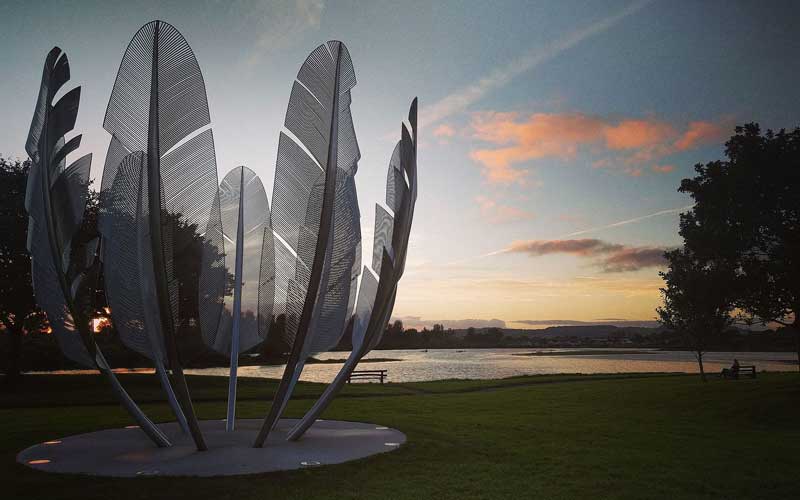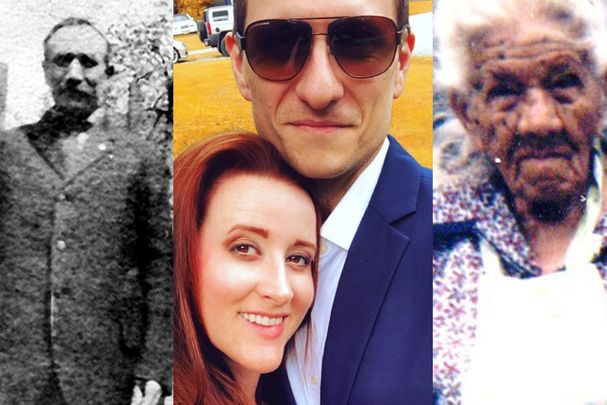Brittany Harlow, a journalist of Irish and Native American descent, examines the true life stories surrounding the crimes against Oklahoma’s Indigenous people.
Tulsa, Oklahoma: When Brittany Harlow reported on Kindred Spirits in March of 2018, something clicked. At that time, Harlow was a television news reporter and weekend anchor for KXII in Sherman, Texas, covering news for North Texas and Southeastern Oklahoma.
The Kindred Spirits monument was unveiled in Midleton, Ireland, in 2017. It is the embodiment of a bond between the Irish and the Indigenous people of Oklahoma that has spanned more than a century.

Kindred Spirts, Cork.
175 years before, the Choctaw Nation, one of Oklahoma’s Five Treaty Tribes, gathered up $170 to send to County Cork during the Great Famine. The Indigenous people heard how the Irish were suffering with little help from their British rulers. It was a familiar tale as the US government had just forcibly removed the Indigenous people from their ancestral homelands on a deadly march known as The Trail of Tears.
$170 in 1847 would have been worth thousands of dollars in 2022. But it was the gesture to help those going through such a familiar struggle, those kindred spirits, that has the greatest impact today.
Though Harlow was just learning about Kindred Spirits at her television news station in 2018, she was very familiar with the Great Famine and Co Cork. Descended from the Sweeney family of Kilbarry Wood near Fermoy, Co Cork, she was well-researched in the famine’s impact on her own family.
Her third great-grandfather Denis Sweeney was born a year before the Great Famine hit. Denis’ future wife Hannah Power would be born at the height of it. Their child Patrick, Harlow’s second great-grandfather, emigrated to Massachusetts in 1891, the same year the Fermoy Board of Guardians (the governing body of Fermoy workhouse and poor law Union) built a cottage for the Sweeney family to live in.
“To know that Oklahoma’s Indigenous people sent over money to my own ancestral homelands, money that likely went to help my own family, gives such a deeper meaning to my journalism work,” Harlow said. “I feel bound to keep that care and support going.”
Harlow launched Verified News Network (VNN) with her now husband Kelly Tidwell, a citizen of the Muscogee Creek Nation (another of the Five Treaty Tribes), in Tulsa in July of 2018. Together, their network provides much-needed coverage of issues relating to Oklahoma’s underrepresented communities, including that of Tribal members.
One of the largest projects the duo is undertaking is helping people with Indigenous heritage “de-assimilate” through news and information.
While many are familiar with the Trail of Tears, less information is available about the next round of tragedy Oklahoma’s Indigenous people were forced to endure: crimes committed against them during the Allotment era.
After being forced to relocate to Oklahoma, Indigenous people were pressured to assimilate into white society through the stripping away of their culture, including their traditions and their language. They were forced to select individual land allotments on their reservation rather than continue living as large families within traditional tribal towns. Their children were taken and sent to Indian boarding schools. When oil and gas were discovered on their land allotments, guardians and others used the court system to take that land away from them, too. Others died mysterious deaths or were thrown in jail. The effects of those crimes still persist as generational trauma today.
In 2022, VNN partnered with the Lucinda Hickory Research Institute (LHRI) to create a new series called “Stealing Tvlse”, dedicated to sharing the untold stories of allotment crimes committed on the Muscogee Creek Nation Reservation.
Click here to read and watch “The tragic story of Lucinda Hickory”, the first story in the new series “Stealing Tvlse”.
“Growing up, this is a burden we have carried in silence,” LHRI Founder Tatianna Duncan said. “Nobody’s surprised. When I go into a Muscogee community, they’re not surprised to hear this. They will tell me their own story.”
Tidwell said growing up, his father rarely talked about their Indigenous heritage. He later found out his great-grandmother, a full-blood Muscogee Creek citizen, forbade anyone to speak their Native language or connect to their culture in any way.
“There’s a lot I still don’t know about my family history,” Tidwell said. “But I am learning more all of the time. So much generational trauma and poverty still exists today. Through our Stealing Tvlse series, people can begin to understand what happened in their own families. They can start healing. They can feel empowered to take the next steps to reconnect with their heritage.”
Tidwell’s family was part of the Thlewathle Tribal Town, which no longer exists today. He is also of Irish descent.
The news couple’s son was born in 2019. Both Tidwell and Harlow say they want their child to know more about their family heritage - the Indigenous and the Irish. They plan to host a live-streamed event on the network’s YouTube channel called “Kindred Spirits: Love and Heritage “detailing their personal work and life experiences on Wednesday, November 23 at 2 P.M. C.T.
VNN and LHRI are also fundraising for “Stealing Tvlse” during Native American Heritage Month. Those who wish to help tell more of these stories can make a tax-deductible donation at givebutter.com/stealingtvlse. You can learn more about VNN here and more about LHRI here.

Love Irish history? Share your favorite stories with other history buffs in the IrishCentral History Facebook group.




Comments